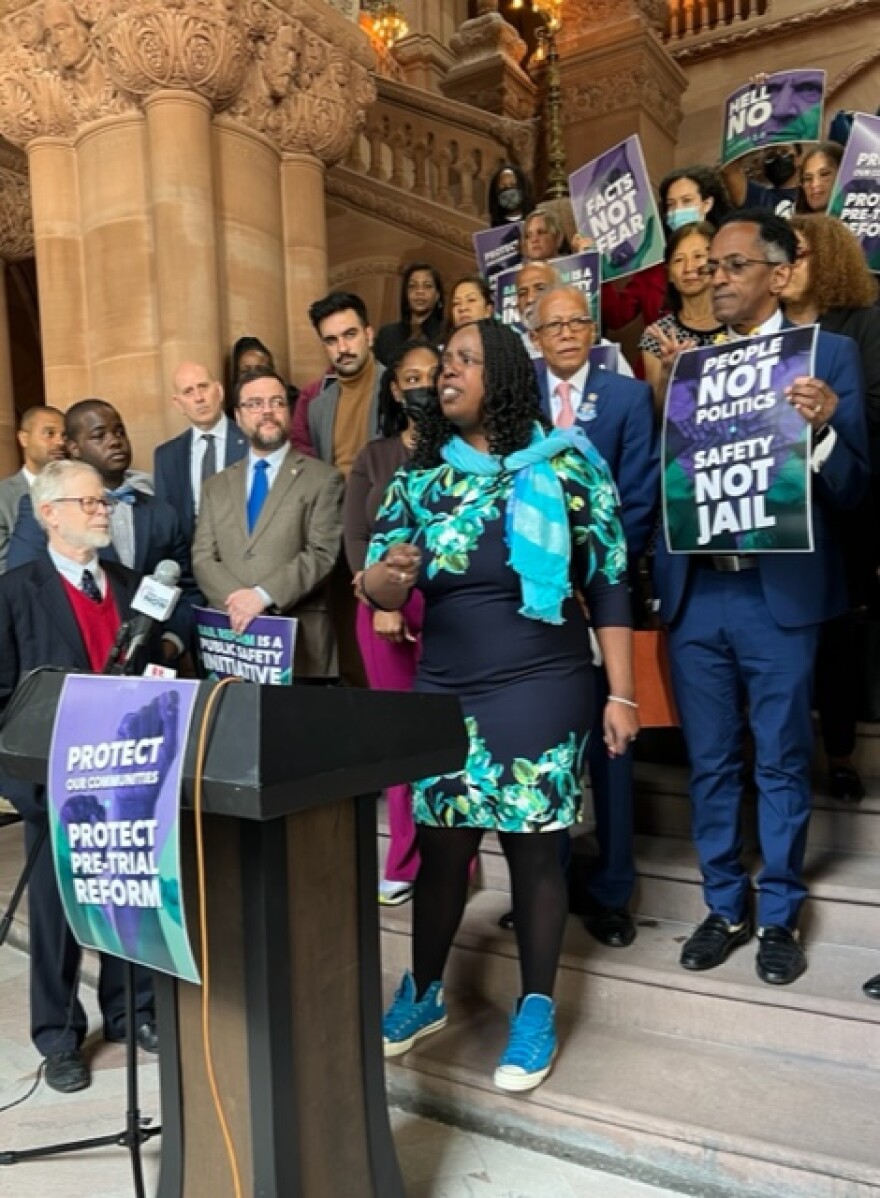Tensions between Gov. Kathy Hochul and the Legislature are intensifying over a proposal to change the state’s criminal justice laws, with the date for finalizing the state budget just over a week away.
A 10-point memo written by Hochul and her top aides that would make changes to the state’s bail reform laws -- which was leaked to the media -- has done nothing to ease agitation over the hot-button issue of rising crime rates.
The governor’s proposals reverse portions of the law that ended most forms of cash bail. They include giving judges the power to determine that a defendant is dangerous and then order them to be incarcerated until their trial date. Many gun-related crimes, including those committed by juveniles, would again become eligible for bail.
Asked about the memo at a pandemic briefing Monday, Hochul defended her decision not to publicly release a plan to change the bail reform laws.
“I will not be negotiating the budget in public,” Hochul said.
The proposed changes have not silenced the governor’s political opponents, both Republicans and Democrats, who say she’s not doing enough to curb the crime wave.

State Senate GOP Minority Leader Robert Ortt wrote a letter to Hochul, asking for more transparency.
Long Island Congressman Tom Suozzi, who will be challenging Hochul in a Democratic primary, held a news conference outside the governor’s New York City offices. He critiqued the leaked memo, saying it is “half-baked” and called on the governor to publicly release her proposals.
“How is that leadership?” Suozzi asked. “You’re the governor of New York state, you’re not going to discuss what your proposal is to address the biggest crisis we are facing right now?”
Meanwhile, progressive lawmakers who backed bail reform and other criminal justice changes are threatening to vote against the budget if it includes any rollbacks of the landmark 2019 laws. Assemblymember Latrice Walker said she’s considering holding a hunger strike.
“I am calling on my colleagues to reject this 10-point proposal,” Walker said to cheers. “We do not want to see it in this budget or any other budget. We’re done.”
Before that rally, Lt. Gov. Brian Benjamin met privately with progressive lawmakers to try to calm them. Benjamin exited the meeting through a side door to avoid reporters. He also declined to answer questions after a public appearance Tuesday, ducking into an elevator to avoid media cameras, including those from New York State Public Television’s “New York Now.”
Lieutenant Governor @brianbenjaminny is not taking questions on bail reform, as seen in this video from about 10 minutes ago.@ZachReports, @therealjsolo and @JonCampbellNY, among others, can be heard here. pic.twitter.com/BTfWl23yDW
— Darrell Camp (@TheTDCamp) March 22, 2022
“We’re not taking questions right now,” an aide said repeatedly as Benjamin walked in silence, changing directions twice before jumping in the elevator.
Legislative leaders have so far resisted making changes to the laws, saying they need more time to work and more data before any decisions can be made.
Assembly Speaker Carl Heastie has said he’s willing to talk about potential changes, but he said it’s too easy to make the laws a scapegoat when crime is rising all over the nation, including in states that have not recently changed their bail laws.
“There’s a bigger issue, which is the pandemic,” Heastie said. “If you look around the country, you’ll see there’s a rise in crime.”
Meanwhile, New York University’s Brennan Center released a report Tuesday that finds no connection can be established between the reforms and the rising crime rate in New York City, saying the “data does not currently support further revisions to the legislation."


